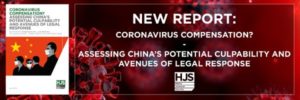“China gave us the virus. And the free world gave us the vaccines.” the chess champion and democracy advocate Garry Kasparov told the NYT’s Bret Stephens.
You don’t have to subscribe to the lab-leak theory of the origins of the Covid-19 pandemic to acknowledge this, adds Stephens:
Had it not been for the cover-up that Chinese officials tried to orchestrate in the critical early days of the crisis, there might have been a chance for the virus to be contained. Instead, China’s government began with lies and has kept lying ever since, at the expense of public health everywhere. They’ve also sold the world’s poorer countries on a vaccine that doesn’t work too well.
 The ruling CCP’s culpability has been confirmed by several authoritative sources, including a report from the UK-based Henry Jackson Society (right).
The ruling CCP’s culpability has been confirmed by several authoritative sources, including a report from the UK-based Henry Jackson Society (right).
Stephens adds an essential insight from Polish philosopher and dissident Leszek Kolakowski. “The rulers of totalitarian countries wish, of course, to be truthfully informed, but time and again they fall prey, inevitably, to their own lies and suffer unexpected defeats,” he wrote in Totalitarianism and the Virtue of the Lie (see below) in 1983. “Entangled in a trap of their own making, they attempt awkward compromises between their own need for truthful information and the quasi-automatic operations of a system that produces lies for everyone, including the producers.”
CCP’s coming ‘existential crisis’
Beijing’s cover-up of the initial COVID virus outbreak in Wuhan featured in a recent panel discussion (above) hosted by the National Endowment for Democracy (NED) featuring Minxin Pei, Andrew Nathan, Perry Link, Elizabeth Economy, Larry Diamond and the NED’s Carl Gershman.

Minxin Pei
“The communist party is an accident of history,” said Claremont McKenna College professor and NED board member Minxin Pei, (right), drawing attention to the CCP’s “very bloody legacy.”
“If you look at the number of people killed in the campaign to suppress counter-revolutionaries…the number is approaching 10 million,” he said, adding that an average of at least 300,000 people died annually due to the regime’s disastrous policies.
“It may be still too early to render a verdict on the return to ideological dogmatism and one-man rule under Xi,” Pei writes in a must-read essay for Nikkei Asia:
But there are enough signs suggesting that, like the last cycle of dogmatism and one-man rule, the party will encounter another existential crisis in the coming decades. China and the U.S. are now locked in a geopolitical duel reminiscent of the Cold War. Its economic fallout will darken China’s economic prospects. The removal of the presidential term limit has all but ensured Xi’s open-ended rule. This eliminates a midcourse correction as long as Xi remains in office.
Australia and New Zealand are both signatories to the Asian Regional Comprehensive Economic Partnership, or RCEP, with dubious implications for democratic cooperation, VOA reports.
“RCEP could be a boon for China,” said Patrick Quirk, a senior director with the International Republican Institute and a nonresident fellow in Brookings’ foreign policy program. “Beijing will undoubtedly promote its increased economic interdependence with and influence over several key U.S. regional allies.”
RCEP “weakens Washington’s relative economic leverage with member countries,” he told VOA.







